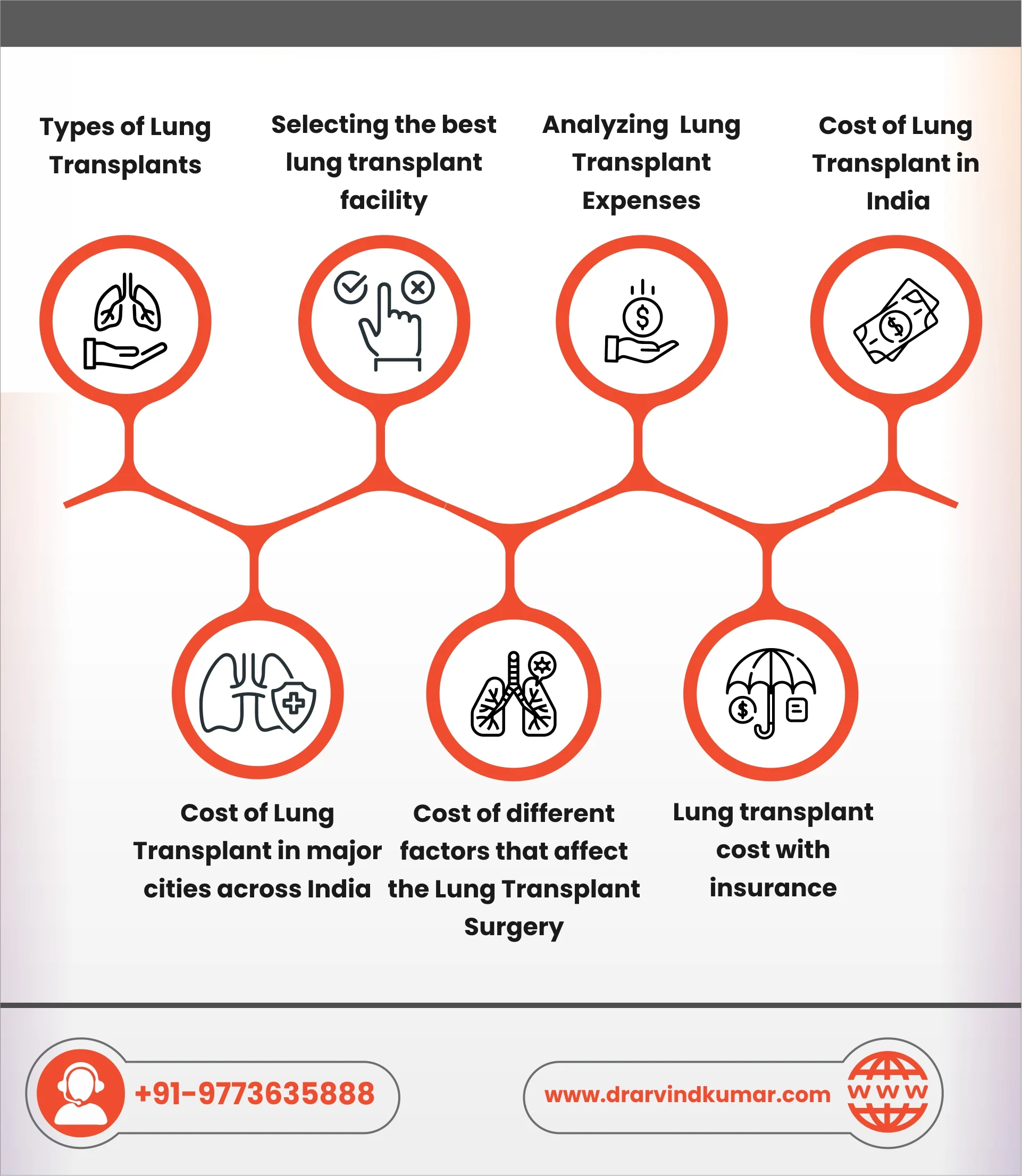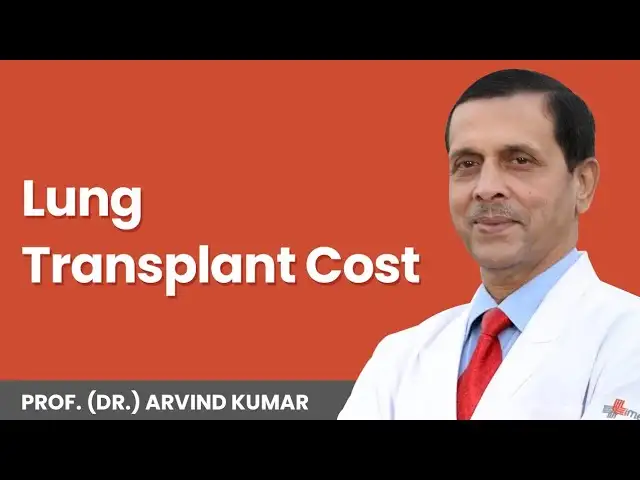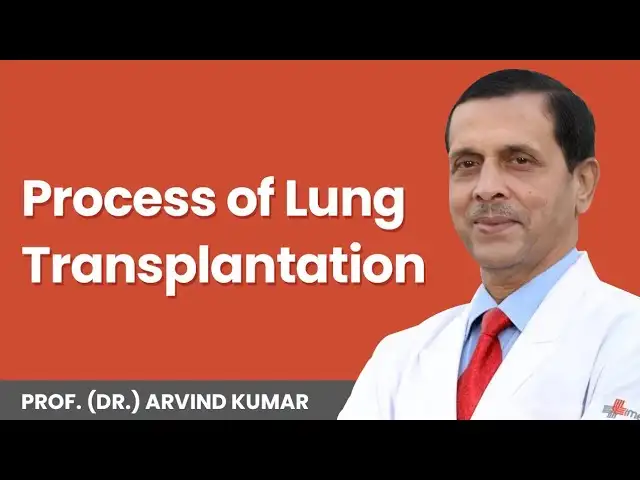After a heart transplant, a lung transplant is one of the procedures that are regarded as the most challenging. It is recommended for individuals whose conditions cannot be managed conservatively and pose a threat to their lives. Typically, the organ is transplanted from a cadaveric donor. Still, it is also feasible to do the procedure with a living donor present, as in the case of a child’s lung transplant.
One of the rare nations where the incidence of lung transplants is as high as the frequency of heart, liver, kidney, and pancreatic transplants, is India. The patient’s projected lifespan if the lungs are completely destroyed is 1.5 years, and rehabilitation is not an option — surgical intervention is required. Lung Transplant Cost And Success Rate In Delhi
Types of Lung Transplants
| Type of Lung Transplant | Procedure | Conditions | Suitable For |
| Single Lung Transplant | The patient receives a single lung from a deceased or healthy donor. | Suited for patients suffering from cystic fibrotic lung disease. | Patients who are less than or of 65 years of age or with a small chest. |
| Double or sequential Lung Transplant | The patient is a recipient of two lungs, mostly from a cadaveric donor. | It is a suitable option for patients who have bronchiectasis, emphysema, cystic fibrosis and pulmonary hypertension | Patients who are of 60 years of age or less. |
| Combined heart and lung transplant | The patient is a recipient of both a heart and two lungs, mostly from a cadaveric donor | It is a suitable option for patients suffering from serious cardiac conditions along with a lung disease or to those who have congenital conditions. | Patients who are less than or of 60 years of age. |
Selecting the best lung transplant facility
Before choosing a transplant centre, patients must become familiar with all available options. A few considerations while choosing a transplant facility are as follows:
- Reputation of the facility/hospital, mortality rates, level of technological sophistication, and medical staff.
- whether your insurance is accepted by the facility/hospital.
- Getting to and from the patient’s house has the advantage of location.
- Whether the transplant facility/centre specialises in deceased donor or living donor transplants.
- Ask different medical professionals and/or patients who have had transplants at the centre about their experiences.
- How much experience does the hospital or centre have in handling transplant cases.
Analyzing Lung Transplant Expenses
Lung disease can be hard to live with, both for the patient and their loved ones. Patients with end-stage lung illness can have a significant improvement in quality of life after receiving a lung transplant.
In India, the cost of a lung transplant might range from anything between 25 to 35 lakhs. Patients and their families should contact their insurance providers to determine whether the cost of an organ transplant falls under their insurance policies.
A few other factors, such as the following, also affect the price of the lung transplant:
- Charges for organ recovery and transportation.
- Infrastructure and technology in hospitals.
- Use of cutting-edge procedures, the expertise of professional surgeons, and their teams.
- Length of hospital stay and chosen room category.
- Any complications with one’s health.
- Rehabilitation and recovery.
- Medication following transplant.
Patients who do not live close to the hospital or have travelled there from another city must also consider the expense of living in the new location. Most patients and their families decide to rent a residence near the hospital for a brief period. Over a few months, these expenses can pile up.
Cost of Lung Transplant in India
The minimum cost of a lung transplant in India starts at INR Rs.12,35,000.
The average cost of lung transplants in India is approx INR Rs.17,00,000.
The lung transplant price in India can go as high as INR Rs. 27,50,000.
What is the cost of a lung transplant?
- Several elements that could impact the price of lung transplants in India include:
- Admission fee
- Surgeon fee
- Patient’s age,
- the patient’s state of health
- donor type
- postoperative issues that are involved
- Hospital Room that you choose
- Any additional laboratory or examination tests, such as an X-ray or an ECG,
When all of these considerations are taken into account, one lung transplant procedure in India typically costs between USD 17,000 to USD 39,000, while a similar procedure in the US costs roughly USD 5,44,000

Cost of Lung Transplant in major cities across India
| City | Cost (INR) |
| Bangalore | Rs.13,00,000 – Rs.25,00,000 |
| Delhi | Rs.13,65,000 – Rs.26,25,000 |
| Mumbai | Rs.14,30,000 – Rs.27,50,000 |
| Gurgaon | Rs.13,00,000 – Rs.25,00,000 |
| Chennai | Rs.12,35,000 – Rs.23,75,000 |
| Hyderabad | Rs.13,00,000 – Rs.25,00,000 |
| Pune | Rs.13,00,000 – Rs.25,00,000 |
Cost of different factors that affect the Lung Transplant Surgery
| Factors affecting the cost | Price (INR) |
| Cost before surgery [physical examination, basic health check] | Rs.500 to Rs.2,000 |
| Specific tests procedures depending upon the health condition of the patient [Ultrasound, Color Doppler & CT scan, etc.] | Rs.10,000 |
| Cost of Donor organ | Rs.15,00,000 to Rs.35,00,000 |
| Cost of Surgery | Rs.80,000 to Rs.2,00,000 |
| Cost of Follow-up visits | Rs.1000 (For each visit, 2 visits may be needed) |
| Post-surgery treatment & Medicines | Rs.10,000 to Rs.50,000 |
| (ICU & General ward) Daycare (5-10 days) | Rs.10,000 to Rs.20,000 |
Lung transplant cost with insurance
Organ donation has increased significantly in India, whether it be for the heart, liver, kidneys, or lungs. Since most of the time, the donor is not covered by health insurance, most insurance companies until recently did not cover the lung donation cost (harvesting, screening, etc.) for it until recently.
However, health insurance is rapidly evolving and incorporating critical coverages that have long been disregarded. In India, many health insurance companies are stepping up and offering insurance plans with built-in benefits for organ donation or plans with benefits available as an add-on for an additional price.
Health insurance coverage is valid, subject to terms and conditions, for all diagnosed diseases, procedures, operations, and hospitalization-related treatments. Health insurance policies are fairly explicit that they would cover the expense of surgery and any tests and procedures necessary to get the organ transplanted up to the sum insured in the event the recipient needed an organ.
But the organ recipient will be responsible for covering the lung donation cost (harvesting, storage, screening, etc.). Some insurance providers do, however, also pay the donor expenses.
Conclusion
Patients with chronic lung diseases can have a significant improvement in quality of life after receiving a lung transplant. It might move them one step closer to leading regular lives. Lung transplants in India start at around $30,000 per patient. Due to this, Indian medicine is among the most widely used in Europe and the rest of the globe, Which is 80–90% less expensive and more accessible than in western nations like the USA and UK. You must also consider the price of lodging in India in addition to the expense of the procedure. Your stay in India will last roughly three months, though this may change depending on your treatment plan.
FAQs
1. How does a lung transplant change a patient’s life?
The patient’s lung disease symptoms will improve after a successful lung transplant. The majority of lung transplant patients are able to engage in the same physical activities and live regular lives. All lung transplant recipients are advised to get ongoing immunosuppressant medication throughout their lives, along with close medical supervision.
2. What is an organ rejection?
Rejection occurs when the body’s immune system perceives the new lungs as foreign and destroys them. An individual’s immune system will attack an organ after it has been transplanted into their body because it perceives the organ as a threat. Immunosuppressants will be utilised to deceive the immune system into not attacking the donated lung, allowing the transplanted organ to live in a new body. You will be required to take these anti-rejection medications forever. Patients will undergo frequent medical checkups and testing on a regular basis to monitor rejection.
3. Can an individual’s previous lung condition recur in their new lung?
Most of the time, infections don’t return to the lung after the transplant. There are a few illnesses that have been reported to have returned.

.webp)





